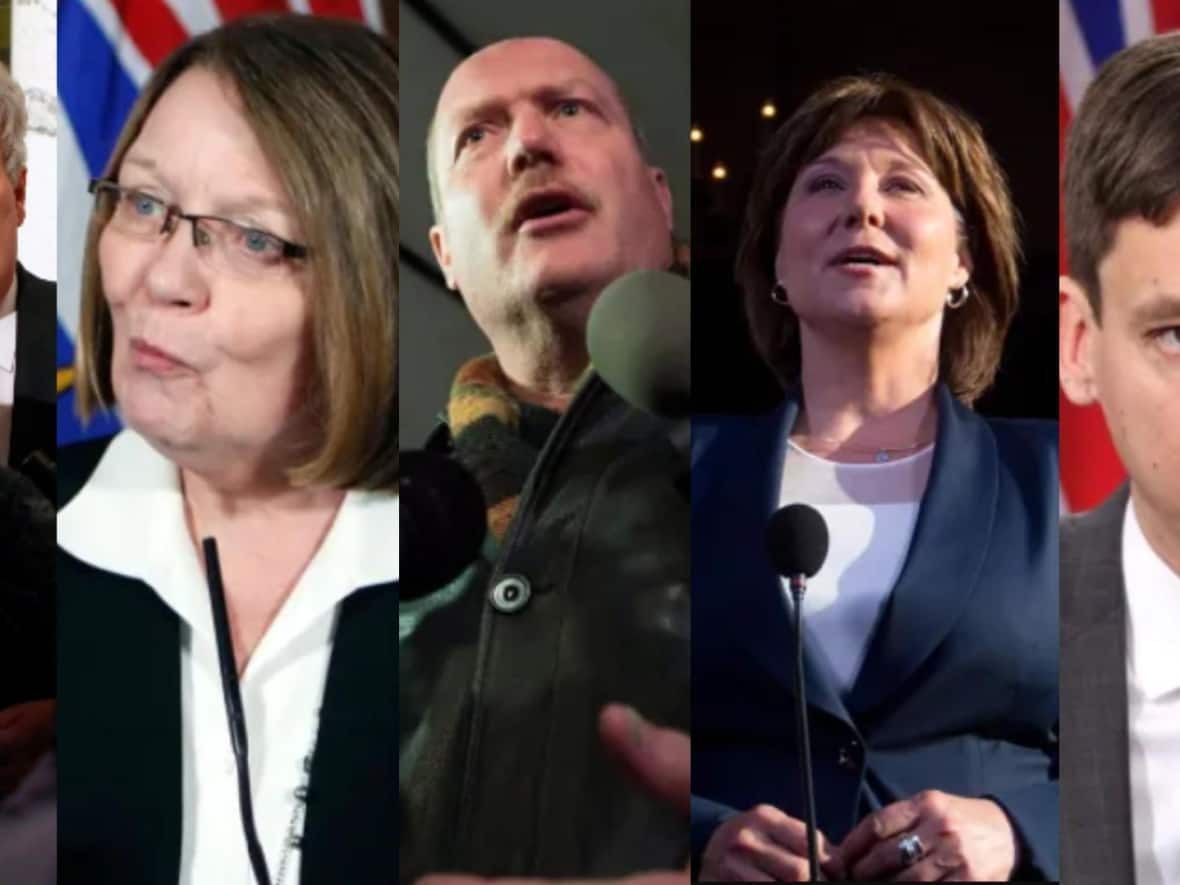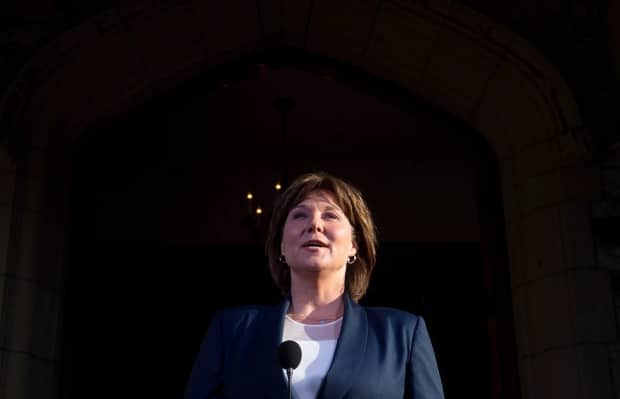What 5 politicians knew as money laundering proliferated in B.C., according to the Cullen report

Former B.C. Supreme Court Justice Austin Cullen's 1,800-page report into money laundering in B.C. names five elected officials responsible for the gaming file during their time in office — three of whom contributed to the rise of money laundering by failing to take urgent action, the report concluded.
But while former Liberal gaming ministers Rich Coleman and Mike de Jong, and former premier Christy Clark showed a "failure of will" to take action, none were motivated by political, personal, or financial gain, Cullen writes.
"While some could have done more, there is no evidence that any of the failures was motivated by corruption," he wrote.
Gerald Baier, political scientist at the University of British Columbia, says while the report is highly critical of B.C. Liberals and their lack of action, it doesn't present a "smoking gun" of criminal intent.
"There's no proof that they were gaining individually or as a party from this sort of behaviour, however if Cullen was giving them a grade I'm sure it would be something in the C-category — saying there was more they could have done, or that they looked the other way."
Rich Coleman

Rich Coleman served as B.C.'s gaming minister for three periods: 2001 to 2005, 2008 to 2011, and 2012 to 2013.
During the first four years of his tenure, there is little evidence of significant money laundering in the province. But starting in 2008, Cullen writes that Coleman should have been positioned to "respond to this burgeoning crisis from its earliest stages."
According to the report, Coleman received advice from the B.C. Lottery Corporation (BCLC) that the province had "industry-leading anti-money laundering strategies in place," while also hearing concerns from the Gaming Policy and Enforcement Branch (GPEB) investigation division and the RCMP Integrated Proceeds of Crime unit that B.C. casinos were accepting proceeds of crime.
Coleman responded by asking BCLC's Robert Kroeker to conduct a review of anti-money laundering measures in the gaming industry.
Cullen found that this action was "prudent." But while Coleman was seeking counsel behind the scenes, he was publicly downplaying the problem. For example, in 2011 Coleman publicly criticized a senior RCMP investigator who had confirmed to CBC News that he had found dirty money in B.C. casinos.
Cullen concluded that "[Coleman] should have recognized that there was a need to take aggressive action to bring an immediate end to the suspicious activity that, by the end of his tenure, was clearly spiralling out of control. Mr. Coleman did not take such action. In this regard, in my view, a critical opportunity for decisive action was missed."
Shirley Bond

Shirley Bond was the minister responsible for gaming from March 2011 to February 2012, while also juggling responsibilities as the minister of public safety and solicitor general.
Cullen wrote that Bond held the gaming file at a critical time, when suspicious transactions were beginning to proliferate in B.C.
But he found she had little experience with the industry, and was not given briefings or directions on the issues it faced.
When the Kroeker review commissioned by Coleman was completed, Bond implemented nine of 10 recommendations put forward.
The tenth recommendation, the "creation of a cross-agency task force to investigate and gather intelligence on suspicious activities and transactions at B.C. gaming facilities," was delayed until the impact of the first nine could be evaluated.
Cullen wrote that the immediate creation of such a task force could have made a significant impact on money laundering in the gaming industry.
But he ultimately concluded that "given the information available to Ms. Bond at this time, it is simply not reasonable to expect that she could have recognized the urgent need to take these actions."
Mike de Jong

Mike de Jong served as the minister responsible for gaming between 2013 to 2017, a time when suspicious transactions in B.C. peaked.
Cullen found that between 2013 and 2015, de Jong "took no meaningful action in response."
"It does not appear that Mr. de Jong received information that would have led him to identify a need for action," Cullen wrote.
In September 2015, de Jong received alarming information about the state of the industry, including that in 2014, BCLC reported 1,631 suspicious transactions with a total value of more than $195.3 million — an average of nearly 4.5 transactions and more than $500,000 per day.
De Jong responded by creating the Joint Illegal Gaming Investigation Team and issuing a letter with directions to BCLC.
Cullen wrote that de Jong accomplished these measures with "remarkable speed" but that the letter to BCLC did not go far enough, because it did not require that BCLC immediately cease accepting highly suspicious cash.
Cullen also found that prior to 2015, de Jong could have independently sought more information about the state of the industry he was responsible for.
"That it was under Mr. de Jong's watch that the tide of suspicious transactions finally turned and the suspicious cash entering the province's casinos began to decline is a testament to the significance of his efforts," wrote Cullen.
"The scale of the crisis gripping the province's casinos at this time required much more decisive action. While positive, the steps taken by Mr. de Jong were simply not commensurate with the urgency of the problem facing the industry at that time."
Christy Clark

Christy Clark was premier from 2011 to 2017. Cullen found that as premier, Clark did not have the same level of engagement as the other politicians named in the report, or the statutory powers over the industry held by the gaming minister.
Cullen found that Clark was concerned about money laundering in the province after reading about suspicious cash transactions in media reports. But while Clark acknowledged "more needed to be done," she assumed that the recommendations made by the Kroeker report were working, and trusted her ministers to stay on top of the issue.
Cullen said Clark didn't understand the scope of the crisis, after she testified that before 2015, she was not aware that buy-ins for hundreds of thousands of dollars — often paid in $20 bills — were frequently occurring at Lower Mainland casinos.
In September 2015 Clark was advised by de Jong that "we have a problem." Cullen wrote that at this time, Clark did not ask about whether "the vast quantities of cash identified as suspicious were being accepted by casinos, and consequently, contributing to the Province's revenue."
Cullen wrote that while Clark did not bear sole responsibility to stop the growth of money laundering, her lack of action on the file after 2015 did contribute to its rise.
"The premier learned that casinos operated by a Crown corporation and regulated by government were reporting enormous quantities of suspicious cash and, in her words, this was cause for 'serious concern,'" he wrote.
"A response that failed to determine whether these funds were contributing to the revenue of the Province and failed to stop this practice for the remainder of her tenure as premier was inadequate."
David Eby

David Eby became B.C.'s attorney general and the minister responsible for gaming in 2017 after the provincial NDP came to power.
In his early days in office, Eby was briefed by the BCLC and the GPEB, which provided conflicting accounts of what was happening in the industry. Cullen found that while the BCLC described the industry's anti-money laundering regime as "North American-leading," the GPEB "depicted an industry awash in illicit funds and a lottery corporation resistant to taking any steps in response."
Eby responded by seeking external advice — leading to RCMP commissioner Peter German's 2018 report, which found that $100 million had been "cleaned" in B.C.
Cullen wrote that Eby acted "prudently," and his actions did not contribute to the rise of money laundering in B.C.


